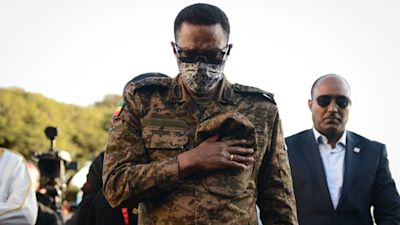Why are people in Ethiopia's capital being told to arm themselves in a defence against rebels?

ITV News International Affairs Editor Rageh Omaar reports on the alliance of Ethiopian factions putting the government at risk of overthrow
Ethiopia's military has appealed to former soldiers to rejoin the army, as it looks to fend off a rebel advance which threatens to seize control of the country's capital.
Military veterans have been called to join the bloody conflict, which has entered a new phase now the Tigray People's Liberation Front (TPLF) approach the strategically important city of Addis Ababa.
Amid a rapidly deteriorating security situation, the US Embassy on Friday urged US citizens to leave Ethiopia “as soon as possible”.
In a statement approved by the 15 council members on the same day, the UN Security Council called for an end to the conflict, expressing serious concern about the impact the year-long war is having on “the stability of the country and the wider region”.
It came after a state of emergency was imposed after the TPLF claimed to have captured several towns in recent days.
While Zambia's President Hakainde Hichilema said the situation in Ethiopia is one impacting "all of us" in Africa and the globe.
"Some will be injured and will be maimed permanently, impairing their ability to look after themselves and look after their families," he told ITV News.
On Sunday, Ethiopia's prime minister Abiy Ahmed called on citizens to "organise and march through [any] legal manner with every weapon and power... to prevent, reverse and bury the terrorist TPLF".
The group of rebel fighters have waged a year-long offensive against state forces and have now joined with other armed and opposition groups in an alliance against Abiy's government.
The new rebel alliance includes the TPLF and Oromo Liberation Army (OLA), who this week claimed to have seized control over the town of Kemise, 200 miles north of the capital.
A spokesman for the OLA, Odaa Tarbii, said the possibility of forcing the prime minister out will depend on Ethiopia’s government and events over the coming weeks.
“Of course we prefer if there’s a peaceful and orderly transition with Abiy being removed,” he said.
The United Nations human rights chief Michelle Bachelet says the war has been marked by “extreme brutality” that could amount to war crimes and crimes against humanity.
Thousands of people have been killed in the conflict, while millions have been displaced and hundreds of thousands are facing famine conditions, according to the UN.
What started the current conflict in Tigray? Tigray leaders had dominated Ethiopia’s government for nearly three decades, creating a system of ethnic-based regional states. When prime minister Abiy took office in 2018, he moved to centralise power, sidelining TPLF leaders and making peace with Eritrea after years of war, a diplomatic role that earned him a Nobel Peace Prize. This move angered Tigray leaders and, after last year’s election was delayed due to Covid-19 concerns, legislators from Tigray withdrew from the national parliament in protest and declared Abiy’s mandate illegal. In September 2020 the TPLF held unofficial elections in Tigray and reported a 98% percent victory in the popular vote. The government then opened a military offensive, saying Tigray forces had attacked a military base. Mr Abiy declared his hand had been forced by the assault on the federal army base and sent the army “to save the country and the region” by removing the TPLF.
Why has the security situation deteriorated so rapidly over recent months?
Following some of the fiercest fighting of the conflict, Ethiopia soldiers fled the Tigray capital, Mekele, in June.
Facing the current Tigray offensive, president Abiy declared a national state of emergency with sweeping detention powers on Tuesday. The Tigray forces say they are pressuring Ethiopia’s government to lift a deadly months-long blockade on their region of around 6 million people, where basic services have been cut off and humanitarian food and medical aid are denied.
Child malnutrition levels are now feared to be at the same level as they were at the start of the 2011 famine in Somalia.
What is likely to happen next?
There are international efforts to prevent a violent military showdown in the capital city.
US Secretary of State Antony Blinken in a statement called on the Tigray and OLA forces to “immediately stop the current advance towards Addis Ababa.”
He also urged Ethiopia’s government to halt its military campaign, including airstrikes in Tigray, and the mobilisation of ethnic militias.
War rhetoric on both sides, however, means that violence is likely to continue.
This week, the government urged residents to register their weapons and called them to prepare to protect their neighbourhoods.
Ethiopia’s government called the alliance “a publicity stunt, asserting that some of the groups involved ”are not really organizations that have any traction.”
It also asserted that life in the capital had a “sense of normalcy” and rejected any notion of a siege.